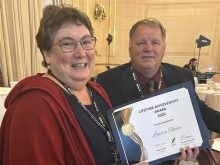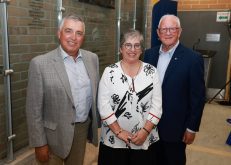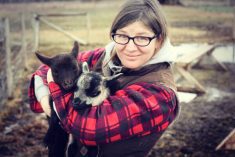As she approached university, Erin Armstrong thought agriculture had very little to do with her.
“I’m not a farmer,” she told a farming friend who encouraged her to study agriculture. She said something similar to a biology teacher who said the field might have a place for her — a young woman looking to go into a technical, scientific field.
“It was the two of them planting that seed of an idea in my mind,” Armstrong told the Co-operator.
In hindsight Armstrong, currently interim executive director at the Barley Council of Canada, thinks of all the opportunities she’s had she would not have known to consider.
Read Also

VIDEO: Manitoba’s Past Lane – Jan. 31
Manitoba, 1946 — Post-war rations for both people and cows: The latest look back at over a century of the Manitoba Co-operator
Armstrong spoke at the virtual 2020 Advancing Women in Agriculture conference where she shared thoughts on her diverse career through the lens of opportunities. She also spoke to the Co-operator from her home in Winnipeg.
Opportunities pursued
Convinced by her friend and teacher, Armstrong entered the agriculture program at the University of Manitoba. At that time, first-year students spent six-week blocks in the six departments — plant science, animal science, food science, entomology, ag engineering and ag economics.
It was immediately clear that entomology wasn’t the department for her.
“Bugs and I don’t get along,” she said.
In a process of elimination, she chose food science. She liked the applied nature of the topic — after all, everyone eats.
After school, Armstrong pursued opportunities to travel. She told the Advancing Women in Agriculture conference that she’d grown up listening to stories of her dad and aunt backpacking around Europe.
During her undergrad degree she talked about travelling so much that someone finally told her, “Either go or stop talking about it.”
She heard about an exchange program for students in technical fields and unsuccessfully applied in her third year. In fourth year, she applied again and got back-to-back positions in Finland, then Switzerland.
“I literally wrote my last exam and got on a plane the next day,” said Armstrong.
She had six months of work as a lab technician, then was free to spend another six months backpacking Europe like she’d dreamt.
Back in Canada, Armstrong worked as a lab tech for a while before realizing she’d prefer to do her own research. She began working on her PhD — a study on wheat proteins — in a lab at Agriculture and Agri-Food’s experimental farm.
There she met several people from the ag and food industries and realized she could do research in the industry, not just government or academia. This led her to take a research position at General Mills in Minneapolis.
Opportunities that fell from the sky
While at General Mills, Armstrong was approached about a research position at Canada Malting. Armstrong accepted, though she knew almost nothing about malting.
She recalled cramming on her way to Calgary, reading a textbook on the plane. She came up to speed by “doing homework, as much homework as I could,” asking many questions and immersing herself in the work. She also had a helpful boss and colleagues, Armstrong said.
She would spend six years at Canada Malting and another eight years at the Brewing and Malting Barley Research Institute.
Then “another opportunity fell from the sky,” said Armstrong. Again, she got a job offer in a field she knew little about — the seed industry.
As she considered the offer, Armstrong did something for the first time in her career. She stepped back to evaluate what she wanted in a job. She made a list and compared her existing job to the offer.
“I wanted to work in ag,” Armstrong said. “I wanted to do work that matters, to make contributions, and I wanted to be personally challenged by the work I was doing.
“That was and remains my personal checklist,” she said.
Taking inventory led her to Canterra Seeds where she’d spend 11 years before taking the term executive director position at the Barley Council of Canada.
Know which opportunities to turn down
It’s important to know what you don’t want to do, along with what you want to do, said Armstrong.
“Know your motivation,” she said.
It’s good to know if you’re considering an opportunity because you feel you should or because you want it, she said. It’s OK to turn down an opportunity.
Armstrong said the opportunities and accomplishments she appreciated most were “the ones where we accomplish something as a team,” she said, and where she helped others advance their careers.
She’s been able to work in multiple positions in multiple ag and food sectors and work with breeders, researchers, industry folk, producers and government people. Ultimately they all want the same thing, said Armstrong — what’s best for Canadian agriculture.
















